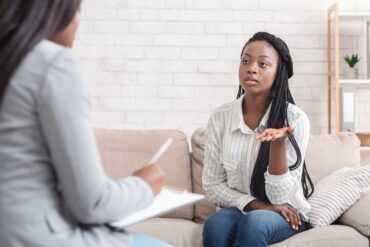Could you be experiencing anxiety symptoms and not even realize it? Some of life’s most significant challenges occur when we face an obstacle but can’t correctly identify what’s causing the roadblock. Consider a romantic relationship that gradually shifts from fulfilling to unhappy. Most frustrating is when the couple can’t pinpoint why exactly they’ve become unfulfilled in their bond.
In the same way, anxiety can sneak up on you. It leads to struggles you may attribute to some other supposed cause, or you may be in the dark for any reason at all. Why is this a big problem? Until you discover anxiety is weighing you down, figuring out how to deal with anxiety is impossible.
Thankfully, anxiety has subtle indicators for those who haven’t spotted it yet. Maybe you notice them in a partner, friend, family member, or yourself. Either way, once you finally find out the reason for your declining life quality, you’ll be able to take the necessary steps to improve. Here are some hidden signs you may have high anxiety and not even know it.
Unexplainable Physical Health Complaints
Do you experience debilitating headaches, neck or back pain, fatigue, or poor sleep? These are just a few of the symptoms of anxiety that can show through various physical aches, pains, and complaints.
It’s easy to assume these bodily ailments have purely physical causes. However, mental distress often leads to physical health challenges too. Some of these can occur regularly, making it tough to function how you need or want.
As if your hidden anxiety wasn’t enough, now you have physical symptoms, leading to even more anxiety. It doesn’t take much imagination to see how this could lead to ever-increasing anxiety, stress, and life disruptions. And until that anxiety cycle breaks, things will likely continue to grow worse.
In his “Psychology Today” article entitled 6 Signs You Are Anxious and Don’t Know It, Evan Parks, Psy.D. shares the following scenario to illustrate the connection between anxiety and physical health complaints:
“People are not coming in to see their doctor saying, ‘You know my marriage has been quite unsatisfying for the past five years, which is about the time my headaches and irritable bowel syndrome (IBS) started. Maybe you could help me look at my marriage issues and provide me with some tools for handling that better.” Rather, what people say is, “What can you give me for my chronic headache and upset stomach?’”
Parks admits it isn’t only patients seeking physical health relief who struggle to see the connection between anxiety and physical health concerns. He says physicians often fail to see how strong the link is. Parks recommends thinking back to when your pain started and investigating if there were any life stressors or transitions that could have triggered those adverse physical reactions.
By all means, make sure you don’t have a physical health complaint with a mostly physical explanation. At that same time, remember that anxiety and depression can lead to all kinds of troubling aches and pains.
Identifying and Sharing Emotions Is Difficult for You
Some people are very in tune with their emotions. Sure, at times, they may feel some ambivalence and struggle to describe how they’re feeling, but that isn’t the norm.
At the same time, many individuals regularly struggle to identify how they’re feeling. They may not have good insight into how different life struggles and positive aspects make them feel. If you can relate to struggling in this way, it’s more likely you’ll fail to see how much anxiety is plaguing your life until things get bad. The last question you’re probably wondering is, “What does anxiety feel like?”
Think of someone who doesn’t have a mechanical bone in their body driving a car with dangerously low oil. On they drive, thinking everything’s fine, while always on the brink of engine failure. In the same way, people go through their lives thinking they’re doing well emotionally when sometimes they are not.
But it isn’t just identifying emotions that’s a struggle for some. It’s also sharing their emotions with others. All of us have the need to share our ups and downs with close friends and family. Everyday superficial conversations rarely provide this. Social media also rarely digs that deep.
When you struggle to name the emotions you’re feeling, it’s impossible to relate with others on a deep level. The inability to consistently share how you’re feeling or to relate to how others are feeling leads to a lot of stress and anxiety.
It begins to feel like you have to carry this whole big world on your shoulders all by yourself. You start pushing all those emotions far into the background. The problem is, they’ll eventually come roaring back if not handled adequately, whether that means social anxiety, relationship anxiety, or something else.
Identifying Your Needs is Challenging
If your struggle to know why you feel so bad is due to anxiety, you’ll have a tough time addressing your needs. You may desperately require a break from work but not realize it. You may not understand how vital deep, meaningful friendships are to life.
A lack of insight into what you need can lead to unhealthy attempts to meet those needs. For instance, you may increase drug or alcohol use to deal with stress or troublesome physical ailments brought on by anxiety. Or you may go to food for comfort or engage in unhealthy thrill-seeking. Because what you need is blurry in your mind, so is your solution.
Are You Struggling with Anxiety Symptoms? Consider Stress Counseling
As you can see, when you have bad anxiety but don’t realize it, this can cause a lot of stress. Worse yet, this is a challenging situation for individuals to resolve by themselves. If you could relate to the possibility of hidden anxiety, please realize your life can drastically improve, especially with proper professional support.
The Orange County Relationship Center can assist you with evidence-based ways to identify hidden signs of anxiety in your life. You’ll also discover anxiety-relief strategies that work rather than self-medicating attempts that only cause more stress in the long run.
If you’d like to learn more about anxiety treatment or whether an anxiety disorder could be interfering, please get in touch. You are also welcome to schedule an appointment with us.



